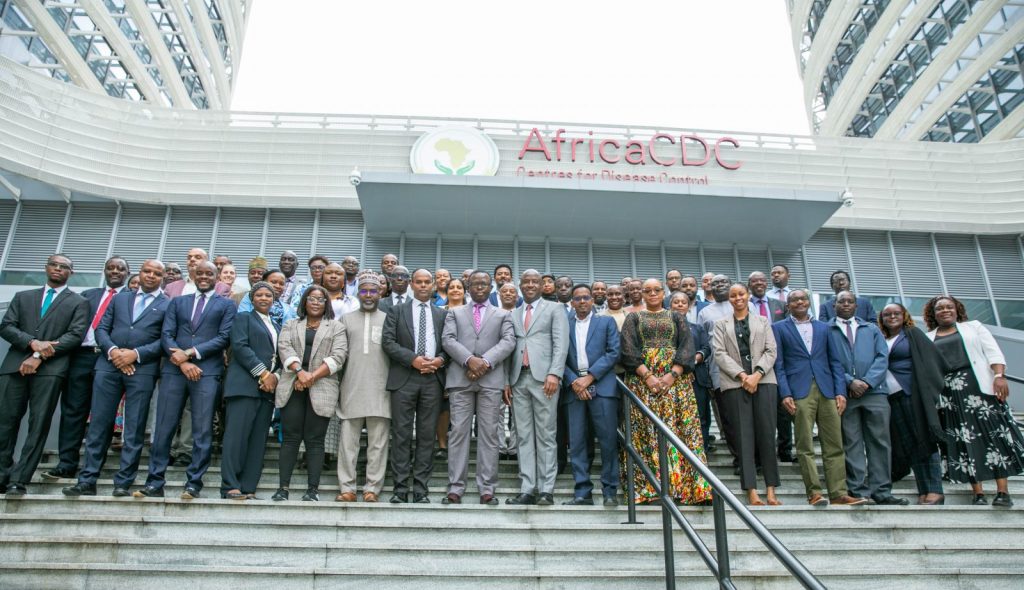
In Africa, the risk of getting seriously ill or succumbing to diseases that no longer respond to treatment has escalated. Children and other vulnerable groups are particularly at risk, as highlighted in a recent report by the Africa Centres for Disease Control and Prevention.
The report, unveiled at the Africa CDC headquarters, revealed that Africa has the highest mortality rate from antimicrobial resistance, with 27.3 deaths per 100,000. This surpasses the combined death toll from HIV-AIDS, tuberculosis, and malaria.
Africa shoulders a significant burden of infectious diseases, with approximately 95% of malaria deaths, 70% of people living with HIV, and 25% of TB deaths globally.
“We cannot turn a blind eye to this silent threat that disproportionately affects the most vulnerable among us,” stated Africa CDC’s Deputy Director-General, Dr. Raji Tajudeen.
Antimicrobial resistance (AMR) occurs when microorganisms like bacteria, viruses, fungi, and parasites build resistance to antimicrobial drugs. Human behaviors such as the misuse and overuse of these drugs in healthcare, agriculture, and food systems accelerate this process.
This resistance makes antibiotics and other antimicrobials less effective, leading to treatment failures, increased disease transmission, severe illness, disability, and higher mortality rates.
Despite the need for an annual estimated $2.6 billion for an effective AMR response in Africa, current funding is only a tenth of that allocated to other major diseases. This funding gap poses a significant barrier to sustainable development, impeding progress toward the Sustainable Development Goals and Africa Union’s Agenda 2063.
Annually, an estimated 700,000 people globally die from drug-resistant infections. Without prompt intervention, this number could soar to 10 million by 2050, with Africa accounting for 4.5 million of those deaths, according to Africa CDC.
Speaking at the launch of a report on AMR in Africa, Dr. Tajudeen emphasized the need for resources and collaboration with member states and partners to save lives. The event also kickstarted discussions on a roadmap and targets to advance Africa’s fight against AMR, setting the stage for discussions at the upcoming United Nations General Assembly High-Level Meeting in September.
Dr. Huyam Salih, the director of the African Union-Inter African Bureau for Animal Resources, stressed the crucial role that the AU must play in combating AMR. She highlighted that AMR is not solely a health issue but a threat to agrifood systems, food safety, food security, livelihoods, and economies.
She warned that by 2050, global healthcare costs could exceed $1 trillion per year, and livestock production could decline annually by 2.6% to 7.5% due to AMR. In Africa, the situation is dire, with 37 countries reporting AMR prevalence on animal farms, while only 16% of African countries conduct routine AMR surveillance in animals as of 2023.
Salih called for urgent action to bolster leadership, enhance surveillance and data systems, advocate for responsible antimicrobial use, improve public and animal health systems, and secure sustainable funding to effectively combat AMR.
“Our health, our food, and our future hinge on the actions we take now,” she emphasized.
Dr. Tajudeen underscored the necessity of engaging all sectors of society in a holistic and multi-sectoral approach to address AMR in Africa. “Unless we unite, conquering antimicrobial resistance will be a challenging and lengthy process costing lives,” he stated.
Currently, millions in Africa lack access to essential antibiotics. A joint study by Africa CDC and the African Society for Laboratory Medicine revealed that only 1.3% of microbiology labs in 14 member states can test for key AMR pathogens.
Mr. Nqobile Ndlovu, the head of the African Society for Laboratory Medicine, reaffirmed the organization’s commitment to bolstering African laboratory capacities to combat antimicrobial resistance. He aims to ensure treatment efficacy and advocate for data-driven solutions to uphold public health across the continent.
Tajudeen stressed the importance of prioritizing infection prevention, fortifying health and food systems, developing human resources, ensuring sustainable access to diagnostics and therapeutics, and investing in laboratory infrastructure for effective surveillance and data generation.
The report proposes enhancing the availability of high-quality diagnostics, vaccines, and antimicrobials for priority pathogens in high-risk African countries.
